St Andrews
About Andrew Cusack
 Writer, web designer, etc.; born in New York; educated in Argentina, Scotland, and South Africa; now based in London.
Writer, web designer, etc.; born in New York; educated in Argentina, Scotland, and South Africa; now based in London. read more
News
Blogs
Reviews & Periodicals
Arts & Design
World
France
Mitteleuropa
Knickerbockers
Argentina
The Levant
Africa
Cape of Good Hope
Netherlands
Scandinavia
Québec
India
Muscovy
Germany
Academica
Day of Whimsy
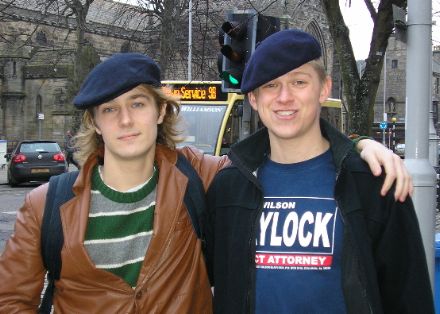
This afternoon Abby and I ran into Chicago’s unwanted child Jamie Branda and Alabama’s biggest liability Chris C. on South Street. They were having a “day of whimsy” and decided to purchase some fetching blue caps from Lord only knows where, and thus I felt compelled to record it for posterity.
Le retour d’Emelie
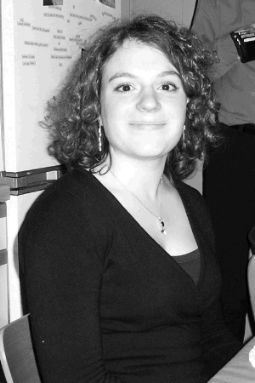
De temps en temps j’ai une excuse pour écrire une entrée en mon pauvre français, et la visite d’Emelie à St Andrews est une excuse par excellence. La merveilleuse Claire Dempsey était assez aimable pour accueillir un petit événement la nuit passée dans le aumônierie (Canmore).
Nous avons discuté des matières fascinantes comme des pommes de terre (ou “spuds” comme Clare les appelle), dommages du rugby d’Emelie, le fait que des fonctionnaires (civil servants) français sont payés pour ne faire rien, et avec précision quoi appeler la couleur de la chemise de Stefano. (Il s’est étendu des saumons à la fraise écrasée).
Clare, Stefano, et Emelie dans la cuisine de Canmore.
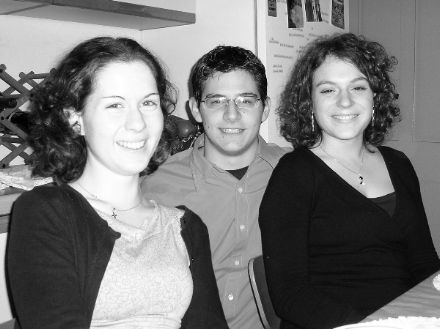
Country Life (Blowing Up Microwaves)
Some have said that the students of the University of St Andrews are pampered layabouts with nothing much to do. Today, we proved them wrong. We packed a microwave with butane-filled baloons and metallic materials and blew it up in a potato patch. And had a barbecue. (more…)
Andreanopolis
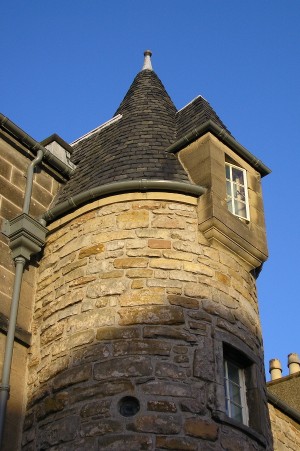
I have taken somewhat ill, so I thought in order to keep the loyal readers entertained, I’d show some photos I took just the other day when we actually had some decent sun. Above is the turret of the Old Union Building on North Street. The building, across Butts Wynd from St. Salvator’s College, was constructed in the medieval period and housed the Admirable Crichton during his student years. It was, from the mid-19th century until the 1960’s, home to the Student’s Union, which was run as a male-only gentleman’s club with billiard room, library, cafe, and such, with the Women’s Union located in the adjacent Georgian townhouses and a dining hall attached in an 19th century addition to the rear. (The Gymnasium used as a drill hall by the OTC further to the rear along Butts Wynd is now the computer center). The two organisations merged in the 60’s and moved into the functional greivous brutalist concrete Student Union building that nobody likes on St. Mary’s Place.
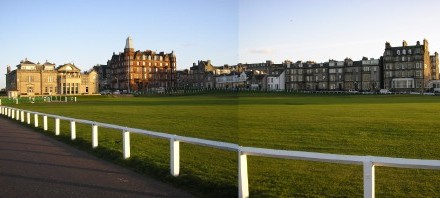
This photograph shows the 18th hole of the Old Course. On the far left is the Royal and Ancient Golf Club, then the red-brick Hamilton Hall (currently a University dormitory but being sold off), and at the far right is the Rusacks Hotel (in my opinion, the best in town). For a closer look at the photo, click here.
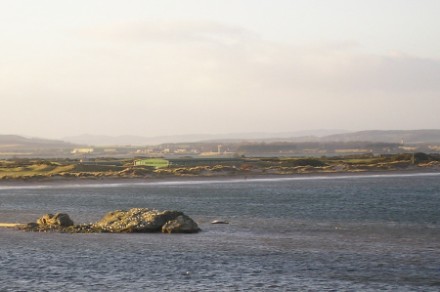
And this photo is taken from the Scores, looking across the bay towards the West Sands and beyond. At the very center of the photo you can just make out the control tower of RAF Leuchars.
Now I will go back to bed, being miserable, and reading about the Popular Front government in 1930’s France. (Boo! Hiss!).
Ash Wednesday
Well. We all had such a Shrove Tuesday that Ash Wednesday was made all the more penetential. The fast was made more endurable by the fact that I only finally rose from my bed about two hours past midday, and upon rising decided to shave off the previously mentioned beard which had seen fit to make its habitation upon my own grim visage.
On embarking upon the rail journey from Edinburgh’s Waverley Station, chance had it that my good friend Emma was in the same railway car, and the conversation made the trip pass much more quickly. Emma lives near Oxford, and had flown up to Edinburgh from Birmingham. Anyhow we discussed the troubles and travails of our measly student existences – finding places to live, grades, people, etc — and Nicholas Vincent was kind enough to pick us up from the barren surrounds of Leuchars rail station and transport us to the Royal Burgh of St Andrews itself.
Emma had to run but Nicholas and I then decided to avail ourselves of the very advantageously-priced Sunday luncheon on offer at the Oak Rooms. A decent lunch for a fiver, though the popularity of the offer meant we had to wait a short while for a table. Thus, a pint of Guinness accompanied our wait and we discussed Freddy St. Johnstone’s keeness on a United Nations career. This sparked me to go on one of my textbook tirades on U.N. corruption and fecklessness, though were I offered a U.N. job which involved freedom from parking violations, kids’ school fees paid, and the effective right to refuse to travel anywhere unless there is suitable accomodation of at least four stars, I wouldn’t refuse.
That evening I stopped into the Russell for a pint with Rob and Maria and was filled in on all the latest talk and chatter. They had, the evening previous, dined with a few friends of ours, Mr. Peter Blair (the convenor of the Debating Society) his belle, Miss Sarah Laurence Goodwin (previously mentioned in these pages), as well as California’s most eligible daughter, Fraulein Abigail Hesser, and Bristol City F.C.’s biggest fan north of the border, Mr. Jonathan Burke.
Monday morning played host to the first of my two courses, ‘France Since 1940: Politics, Culture, and Society’, with the ever capable Stephen Tyre (of last term’s ‘French Algeria 1830-1962’) at the helm. Without last term’s Fraser, I’m afraid that our discussions in pursuit of higher knowledge will no longer be steered towards banter regarding deep-seated Scottish football rivalries. I very much look forward to the rest of the course though. There are a few old faces amongst the other students in the course.
Tuesday, yesterday, was my other course for the term, ‘Art and Piety in Western Europe, 1400-1700’ lead by Dr. Bridget Heal, of whom “Ishmael” is an ardent admirer. Though a Modern History course, it leans somewhat towards Art History, which means that Matt Gorrie, one other fellow, and myself are the only chaps in a class of about fifteen. I look forward to hissing Calvinist iconoclasts and urging onwards Tridentine reformers. Margaret Breed, a Brearley girl who defeats the school’s stereotype by being interesting, engaging, and just plain generally endearing, is also in the course.
Mrs. Freeburn is introducing me to the fascinating world of Bollywood cinema. Cinema aside, the other day I was thinking what a glorious culture and civilization India has, and how magnificent it would be if it was conquered by the Faith. If orientalism in ecclesiastical architecture is to your taste, you might want to check out the Church of the Immaculate Conception in New Orleans, especially the beautiful altar.
Projected printing date of next Mitre: well, let’s hope Friday.
Facebook Comes to St Andrews

We had all heard talk and rumors of this crazy site from all our friends who are conventional enough to attend colleges and universities in the Motherland, but now thefacebook.com has arrived at St Andrews. This popular… well, what the heck does one call it? forum, I suppose, has ventured outside North America for the first time and made itself available to students at St A’s, Oxford, Cambridge, Trinity Dublin, and the American University of Paris.
I have to say, despite my inherent suspicion of all things new and technological, it’s quite a nifty thing. What you do is, you enter your official university e-mail address to verify you are a real student at a particular university and then you make a profile about yourself and your friends do the same and you add them as your official friends and before you know it you have a veritable network of confederates with photos, their birthdays, favorite books and movies, quotes, and everything. You can even poke people (and poking is one of our most formidable pasttimes).
One of my favorite bits is this nifty tally by which you keep account of your official friends at other institutions:
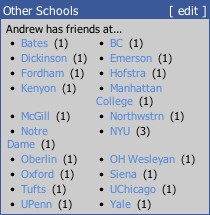
Heck, I just joined last night and I’ve already got twenty-nine of my friends officially friend-ed on Facebook. In terms of non-St-Andreans, NYU is currently in the lead with 3, the rest all have one, but once I get Will Moller added Kenyon will move to second place with 2. I’ve got seven or so St Andreans so far. Niftiness.
Leisure
I AM BACK HOME in New York after having completed my Martinmas term examinations. This morning, my mother, sister, brother-in-law, and I went out for breakfast to celebrate my “triumphant return from another term at university.” (I suggested it might be wiser to wait until the casualty reports are released before we declare it a triumph).
Nonetheless, I now have three weeks of time almost entirely free from obligations to do whatever I please. It is perhaps how a man spends his free time that defines him, as free time is the foundation of civilization itself. Roger Kimball reflects on this in a recent Armavirumque posting, mentioning Josef Pieper and Leisure: The Basis of Culture, a book I was first introduced to by Robert O’Brien whilst still half-asleep at 7:30 in the morning waiting for a train at Leuchars station so we could attend the Tridentine mass in Edinburgh.
Leisure, by which we mean doing something merely for its own sake, is entirely different from mere pleasure. Unfortunately for the English language, we oft mistake the two for synonyms. It is leisure in that latter sense, of idleness and cheap pleasure, which our good friend Prof. Richard Demarco resoundly condemned in a lecture he gave at St Andrews. This kind of leisure, he stated, was leading to the destruction of Scotland, of Europe, and of civilization. Art today, according to Richard, is a collection of usually talentless kitsch which seeks merely to create an arrangement that is pleasing or clever. Art, in Richard Demarco’s world, should not aim to be pleasing, or to be clever, but should have as its essence the very highest that man can achieve: the sanctification of souls. In pursuit of pleasure rather than leisure, tourism is taking over entire countries; a false economy which can enslave the entire population of a given area.
It is certainly rampant in St Andrews. There are many good reasons to visit St Andrews. The third-oldest university in the English-speaking world, for example, or perhaps to see ruins of one of the greatest shrines in Christendom, bearing witness to the visceral damage wrought by the Protestant Revolution (we should refuse to dignify that revulsion with the name of ‘reformation’; it destroyed and replaced, not reformed). Most, however, come for the golf.
While niches once full remain empty from the holocausts of five centuries ago, the Scottish Parliament would prefer to spend its millions (which, you must never forget, are the people’s millions) on encouraging this pointless and ineffective idleness, Demarco pointed out. More recently, South Street, where I live, will soon be shorn of its beautiful trees, those which make it one of the most inviting and comely thoroughfares in the Royal Burgh. This must be done, we are told, to increase the number of parking spaces, the paucity of which might be driving away potential tourists. Perish the thought! Heaven forbid a town be run for the benefit of its inhabitants, for the benefit of itself (but surely by now they have already forbidden Heaven).
As Mr. Kimball points out, the opposite of the former leisure, the leisure which Pieper posits is the basis of culture, is busyness. Perhaps we can extend this to business, for it is the dollar, the pound, and the euro which enslave St Andrews to transient tourists. Without tourism, some say, St Andrews, or Oxford or Venice or wherever, would not survive. But at what price survival? And who defines this survival? That these places are still on the map and are inhabited is for sure. But in some sense have not these places, while encouraging tourism as a mode of survival, been so changed and transformed that in fact they have not survived. Decrepit and rundown, they may have been, but at least they had authenticity; at least they were themselves. Now most of the goods sold in St Andrews – saltires, fake kilts, tam o’shanters, and Scotland t-shirts – are in fact things that can be purchased in half the towns in Scotland, and now with the advent of the internet, you can purchase them while you remain at home. Their cheapness is only accompanied by the sentiment of being a souvenir in the original French sense of the word: to remember. But they are remembrances for short memories, and likely will be thrown out within a year, because we, and it all comes back to this, do not have the time for longer memories.
Thus one of the chief values of an education must be free time. St Andrews affords this, I am glad to say; especially if you are an arts student and are not aiming for a first. All too often friends of mine at universities in the States or at Oxbridge are busy. They are either busy with busywork, (assignments for school which must be done to stay in the university but have little graded value or academic merit) or else busy with social activity and other amusements which vary greatly as to whether one’s in a big city or not (most often the case with NYU students I find).
When I finally start my university, we must make sure that students have enough free time then, perhaps the greatest argument for not locating it in an overactive urban metropolis. Though of course a good part of education is that which transmits information and ideas and, more importantly, inculcates moral values, much must be left up to the student. There is an inherent value in reading not what is required but what is desired.
And so I will get on with my post-exam break, reading the Pickwick Papers, the Everlasting Man, and This Side of Paradise, hopefully with some time to browse through Haldane’s Faithful Reason: Essays Catholic and philosophical (which, on a typographical note, makes ample use of the Gill Sans font).
Travels
I’m back off to Caledonia this evening for my examinations. But I’m back to New York by the evening of next Sunday anyhow, so I’m not gone for long.
For a peek at what our exams are actually like, here are the questions from last year’s exam for “MO3322 French Algeria 1830-1962”. Three questions must be answered in the space of three hours.
2. To what extent did Algerian resistance obstruct the extension of French control in Algeria between 1830 and 1871?
3. ‘For a settler to show that he is Republican he has to show his hostility and disdain for the Muslims’. (Charles-André Julien). To what extent does this describe the development of colonialism in Algeria after 1871?
4. Which factors shaped French views of Algeria and the Algerians, and what do such views reveal about French attitudes to colonialism?
5. Can the Algerian nationalists of the inter-war period be seen with justification as precursors of the independence movement?
6. Assess the role played by Algerian immigrants in France in the development of Algerian nationalism and the War of Independence.
7. Discuss the view that the Algerian War of Independence was in many respects a civil war.
8. Is the controversy over torture during the Algerian War of Independence a satisfactory explanation for France’s difficulties in coming to terms with the war’s legacy?
9. How important were tensions between central government in Paris and the colons in determining the nature of French policies in colonial Algeria?
More Saintliness
The brouhaha over our university’s ironically-titled tabloid, the Saint, has made it to the respectable papers.
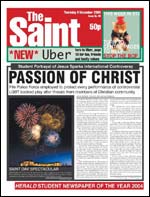 The Scotsman‘s Education Correspondent, Kevin Schofield, writes today under the headline of “University challenge to freedom of speech – and Welsh jokes“. Slightly misleading since in this instance the challenge is from the Students Union not the University administration, but it was given a mention on the front page of Scotland’s national newspaper. The Scotsman also published an opinion piece entitled “New puritanism we last witnessed in ’20s Germany” which seems slightly hyperbolic.
The Scotsman‘s Education Correspondent, Kevin Schofield, writes today under the headline of “University challenge to freedom of speech – and Welsh jokes“. Slightly misleading since in this instance the challenge is from the Students Union not the University administration, but it was given a mention on the front page of Scotland’s national newspaper. The Scotsman also published an opinion piece entitled “New puritanism we last witnessed in ’20s Germany” which seems slightly hyperbolic.
Andrew Murray-Watson reports in the Telegraph of “Student newspaper at St Andrews University closed after ‘making racist attack on the Welsh’“. The most amusing bit from this article is a quote from Saint editor Jo Kerr:
The terms “broadsheet quality” and “sophisticated manner” appearing in an article about the Saint are hilarious! This from a newspaper which feels free to lecture about Christians and Christianity while displaying a wholesale ignorance of the Faith (e.g. referring to St. Patrick as a “biblical superhero” and ridiculous statements about the Christian Union).
The Saint ‘Banned’
The Saint, paragon of social liberalism and this university’s other newspaper, has ironically been banned from using the Student Union’s facilities (in which their offices are located) for making offensive comments about “LGBT students, dyslexics and the Welsh.” How amusing to see infighting amongst the useless institutions of the University!
Oddly enough, despite frequent cause for complaint, there is no mention of numerous offensive comments and innacuracies about Christians. This is probably because most Christians are so used to assaults from the press we don’t bother complaining.
Well, you all read the Mitre anyhow.
Students Association President Simon Atkins’ letter.
Samizdata reports the ban.
Last Days in Andreanopolis
How splendid it will be to return home for Christmas! However, I still have a few days here in St Andrews and a few tasks to get done as well. Breakfast with Nicholas Vincent (Architecture writer for the Mitre) tommorrow. A pint with Chris Pollard sometime in there. Lunch with Tom Leppard, St Andrews’ favourite champagne socialist, Thursday. I told Alex Matzdorf and Ed Jackson both I’d have coffee with them sometime, and hopefully I will in the next three days.
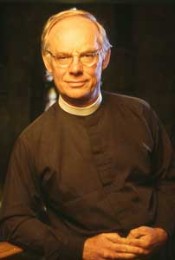 Today was my last academic bit, a celebratory affair marking the final seminar for the ‘Monarchy, Church, and State’ course with Dr. Bradley (seen at right, Kirkin’ it up). It was somewhat embarassing as I was about fifteen minutes late since I stopped to buy sherry for the seminar. There is something moderately amusing about walking into of the rooms in St. Mary’s quad with a bottle of sherry and getting a round of applause. In addition to my sherry, there were other beverages including non-alcoholic mulled wine (NON-ALCOHOLIC MULLED WINE! That’s right, there were Protestants afoot).
Today was my last academic bit, a celebratory affair marking the final seminar for the ‘Monarchy, Church, and State’ course with Dr. Bradley (seen at right, Kirkin’ it up). It was somewhat embarassing as I was about fifteen minutes late since I stopped to buy sherry for the seminar. There is something moderately amusing about walking into of the rooms in St. Mary’s quad with a bottle of sherry and getting a round of applause. In addition to my sherry, there were other beverages including non-alcoholic mulled wine (NON-ALCOHOLIC MULLED WINE! That’s right, there were Protestants afoot).
We were supposed to be covering what will be on the exam, but that pretty much came down to “There will be nine questions to choose from and you’ve had nine seminars. Study them all.” It may be very well for me, but others have dissertations to write, poor souls! Nonetheless, Dr. Bradley insisted the latest Mitre be passed around as he found our editorial rather intriguing. Of course the triumvirate of young Baptist ladies in the corner went straight for Za-Za Shelly’s article on bras. (Have to have something in the Mitre for the fair ones to read). Graham Booth volunteered himself as sports writer.
Already have my first appointment for home. Festival of Nine Lessons and Carols at St Thomas on Sunday. Brenner and I will be going, providing I have any energy left after flying home the previous evening, and hopefully we’ll be able to track down James Feddeck – the man himself – to come along. Ah, but I’m not really home until I hear the euphonic incantation of Asperges me at the 11 o’clock Mass at St Agnes.
Bibliotheca Universitatis Sancti Andreae
One of the less attractive aspects of the University of St Andrews is its library. Most people complain that it’s ugly, inhospitable, and generally not a nice place to be. My main problem, however, is its greivous inefficiency. Never having been to other university libraries, I don’t know if this is widespread or merely a specific case.
I have an essay due on Friday. I want or need books A, B, C, D, and E. So I check SAULCAT, the electronic catalog of the library, and find that D and E have been taken out but that A, B, and C are still in the library. I write down the ‘classmark’ numbers for A, B, and C, and look them up in the stalls. They’re not there. I look on the reshelving cart. They’re not there. Then I look on the shelves of books waiting to be reshelved (no joke), which on Level 3 of the Library are 6 or 7 columns of 5 shelves each with books in no particular order so you have to look through the whole lot. They’re not there. I look through books left in empty study carrels. They’re not there. I look up in the empty carrels on Level 4. They’re not there. At 5:00pm they’re not there. At 9:30 at night, they’re not there. At 1:40 in the afternoon they’re not there. In short, they’re just plain not there. You can go to the front desk and fill out a missing book form, as I naïvely did the first time I experienced this problem. Nothing will happen.
And there are only 5-12 people in the entire university who are probable taking courses that require these books. Yet nonetheless they’re never there. It’s something of a hassle.
Now, taking one particular missing book, The French Army in politics, 1945-1962 by John Stewart Ambler, classmark DC404.A6. Right now, SAULCAT says its status is “IN LIBRARY”. Yet for the past day it’s been nowhere to be found. I could buy a used copy from Amzon.co.uk for £74.95, but obviously that’s not feasible. The books that you can get for cheap and within a day the Library usually has enough copies of anyhow. The book is either lost or stolen and Lord only knows the likelihood it’ll be found before the end of term let alone in time to write an essay for.
A St Andrews Thanksgiving
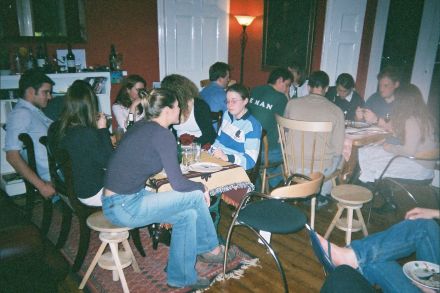
Thanksgiving is one of the things you miss most when you’re abroad. A., Chris, Dave, Jenny, and Za-Za were kind enough to host a Thanksgiving at their residence on Queens Gardens last Friday, since we don’t get Thanksgiving Day itself off. (more…)
And Now… A Rant
I don’t think I have often used this blog for the purpose of a whine, but in this instance, I shall, for my irritation is searing.
There is very little I despise more than writing essays. I despise writing essays with an unquenchable passion that knows no end. It is an excercise from which I draw absolutely no pleasure or reward at all. I don’t even get the feeling of satisfaction or relief one usually gets after having completed an endeavor, and I certainly don’t get good grades. (Just good enough to graduate, which is good enough for me).
Once you’ve finished 2,000 words on French control of Algeria in 1871, then you’ve 3,500 on the extent to which Church involvement in politics is desireable and appropriate. And a presentation on the Coronation service and its elements.
At least Modern History students aren’t required to write 40,000 word dissertations like some departments. We get off with an 8,000 word Special Honours Project or something. I think if I were forced to write 12,000 words I’d sooner kidnap the Chancellor’s King Charles Spaniel and hold it hostage until I negotiated an exemption (though Sir Kenneth would probably die of a cardiac arrest if faced with such a situation).
I’m not saying we shouldn’t have to do them, or that I particularly deserve an exemption from writing essays (though I certainly wouldn’t turn down that offer!). I just absolutely despise writing them.
I very rarely have the mental capacity to sit down and devote my mind to one topic for five minutes, let alone more. (Concentration has never been my strong point). The knowledge that this essay, which I have had to devote useless hours of study and writing to complete, will only ever be read by one (perhaps two) other people, further fills my mind with hatred. What a waste! Anything of any worth I have learned so far whilst at university has been learned either in conversation (be it in the pub or the seminar room) or through individual study, most likely not related to any of my courses.
To heck with them all!
Next Wednesday
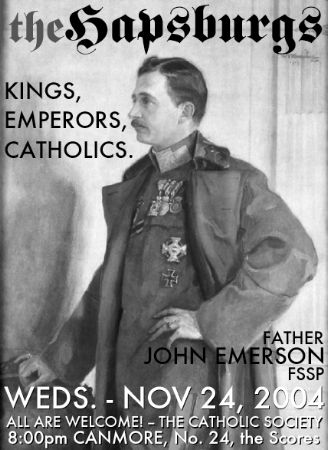
Fr. Emerson will be returning to to Canmore next week to give a talk on the Hapsburgs.
Election
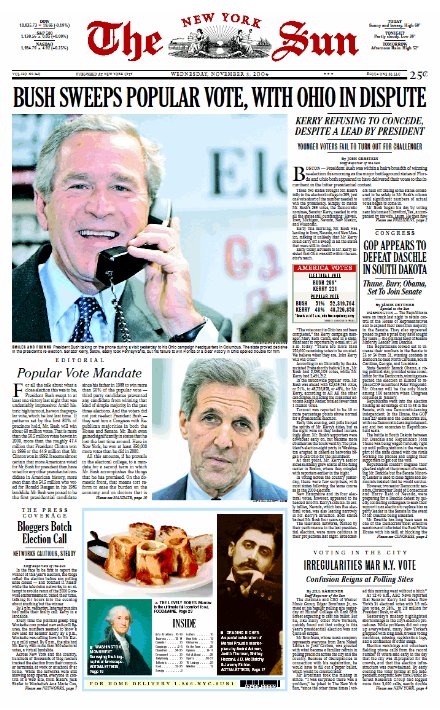
A long morning. A few people filtered into the flat from 1:00am. Kat, Jocie, C., Dave Watt, Rob and Maria. After having some celebratory champagne with future American immigrant D. P. at around 7:00, I finally got to bed around 8:00am and slept until 11:30am. Half past midday now and I need some breakfast/lunch.
Electoral college of beverages consumed: A California’s worth of tea, a New Hampshire of whiskey, and probably about a New York of beer. And an Alaska of bubbly.
Condi versus Hillary in ’08, anyone? God forbid.
The West Sands
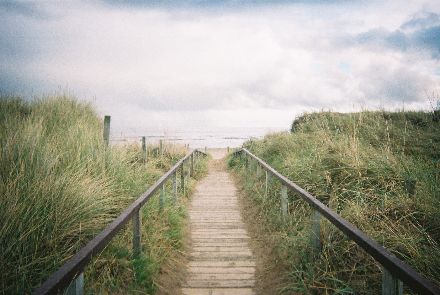
The other day after rosary I realised I had never been all the way to the end of the West Sands and decided to accomplish such a task.
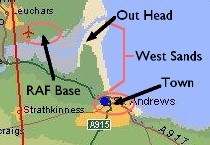
For those who don’t know St Andrews, I’ve provided a little map at right. The West Sands is a long stretch of beach that is about a mile and a half long down the coast from the town of St Andrews to Out Head.
Anyhow, I went all the way to the end, and turned around Out Head. There I perched myself into a sand bank, facing the RAF base at Leuchars, and proceeded to read a bit of Evelyn Waugh’s Black Mischief. It was just past high tide, so the tide was heading out and as it was a late autumnal afternoon, not many people were on the beach. Though it was somewhat chilly, there was no wind, and I found it quite amenable for reading.
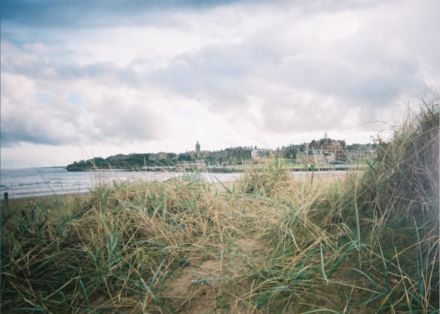
The town as seen from the dunes.
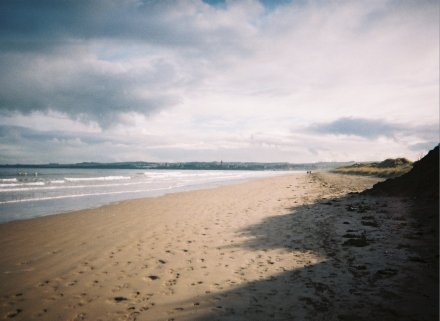
Much further down the West Sands, you can still make out the spires of St Andrews.
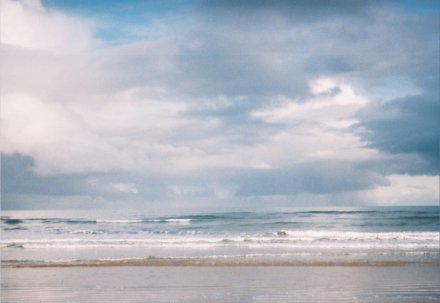
The beach.
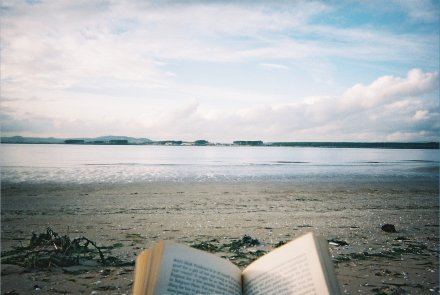
Reading, with RAF Leuchars in the distance. A few fighter jets landed and took off, I believe they might have been Tornados, and three massive Hercules transport planes.
A Breath of Fresh Air
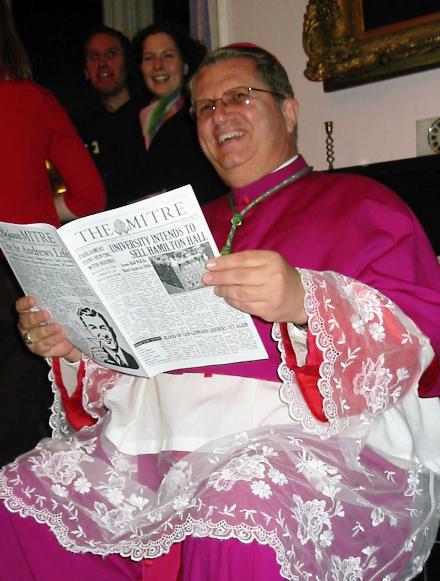
Boy did we have a blast last night! Bishop Rifan of Campos swung by Edinburgh on his tour of the United Kingdom (organised by Una Voce Scotland and the British Friends of Campos), and I was among a number of St Andreans lucky enough to make his aquaintance and receive the episcopal blessing.
It began with a Pontifical Low Mass at the Church of St Andrew in Ravelston, Edinburgh. The church is a wooden structure that would not look out of place in the Catskills or Adirondacks. In fact, it somewhat reminded me of the Chapel at Camp Jeanne d’Arc, where my sister spent her summers growing up. Such a setting in addition to the Mass being in the old rite slightly assuaged my permanent yearning for New York. (more…)
Breakfast at Karzai’s
Woke up at 9:00 this morning and had ‘breakfast’ at the Northpoint Café with C.. I put the word in quotations because breakfast ought to imply a meal, but owing to the Northpoint’s scant menu, breakfast meant buttered toast and a pot of tea. At least it was only £2.00.
The topics of conversation were of the usual C. n’ Cusack ilk: How ridiculous Britain is, how brilliant the States are, delving into meaningless and ultimately feckless points of argument, hoping for the downfall of world Islam, and recalling past misadventures as well as plotting new ones.
I think the only reason we ever have breakfast at the Northpoint is because Afghan president Hamid Karzai had tea there when he was in town last year, and Chris has some sort of bizarre fascination with this.
“French Algeria 1830-1962” was at 11:00am, with Dr. Stephen Tyre. A fascinating class of five students which we usually manage to steer onto some even more fascinating tangent, which itself usually tangentalizes onto football somehow. Today was all about Abd el-Qadir and his jihad. We also discussed an Islamic figure in 1840’s Algeria who claimed his goat was the Prophet Mohammed and sparked a brief uprising. Oh those wacky savages and their messianic goats!
Read quite a lot during the afternoon, had spaghetti bolognese from Pizza Connection across the street (since Jocelyn has Mondays off), and then popped down to the Cellar Bar for a pint of de Konick with Robert O’Brien, Maria Bramble, “Ishmael”, and Jon Burke – an assemblage which ought to be collectively known as the Inappropriate Joke Squadron. Classic.
“Monarchy, Church, and State” tommorrow with the indomitable Rev. Dr. Ian C. Bradley. I think I shall have to abandon or change my Hapsburg essay plans owing to lack of adequate sources.
Shepherd’s Pie and the Sack of Constantinople
Last night I had a few people over for dinner and drinks that lasted until 1:00am. Jocelyn, our trusted agent of culinary perfection, and Jenny, whose ancestors had beastly things done to them by Chinese pirates, cooked up a splendid shepherd’s pie. On the receiving end of said pie were fellow American Rob (one of Jocie’s choir friends), apostate Catholic and former Literary Society president David Taylor, Mitre associate editor and former Catholic Society president Robert O’Brien, his fiancée and my good friend Maria Bramble, current Catholic Society president Matthew Gorrie, California’s prettiest Antiochian Orthodox girl Abigail Hesser (engaged to an Aussie), and Connecticut’s prettiest Choate grad, Kat ‘Kiki’ Murphy.
Jocie and Jenny left for the Byre shortly after dinner to meet up with a friend of theirs. We were then joined by traditionalist/OTC/Old Cliftonian Jon Burke and the legendary Blackpudlian, “Ishmael”.
I think we got through four or five bottles of wine if not more, at least one bottle of port, and luckily not too much of my whiskey. We just about went through our entire retinue of politically-incorrect jokes as well. One of the highlights of the evening was getting the former ‘most enthusiastic man in St Andrews’ on the phone: none other than the great Peter Cox. We had all had a fair amount to drink and decided calling Brussels wasn’t a bad idea. True to form, Peter Cox was enthusiastic as ever, explained that he is organising things for the upcoming World Youth Day and working in a youth hostel to pay the bills. The man is brilliant.
We listened to half of Bach’s Mass in B Minor, our favourite Breton/French hip-hop/jazz group Manau and the obligatory Smashing Pumpkins.
One of my flatmates left his KK tie lying around, and Jon Burke decided to put it on. Fair enough. Unfortunately, Burke forgot he had it on, left my place and proceeded to Ma Bell’s – one of the preferred night spots for members of the Kate Kennedy Club. Of course the first KKer who observed Jon and his illegitimate usage of club neckware gave him a right verbal bollicking. Still, nothing nearly as bad as what happened when Paul Pennyfeather ran into the inebriated members of the Bollinger Club wearing his old school tie which was surprising similar to that of the Bollingers. This, of course, took place at Scone College, Oxford in Evelyn Waugh’s Decline and Fall.
David Taylor agreed to write a piece on Derrida for the next Mitre, although it’ll probably be fawning. The current crisis in modern poetry was discussed, and it was agreed that Milton is more important than Shakespeare.
“Yeah, Abby. That’s about as funny as the sack of Constantinople.”
– “Ishmael”
Search
Instagram: @andcusack
Click here for my Instagram photos.Most Recent Posts
- Gellner’s Prague December 19, 2024
- Monsieur Bayrou December 18, 2024
- Dempsey Heiner, Art Critic December 17, 2024
- Vote AR December 16, 2024
- Articles of Note: 12 December 2024 December 12, 2024
Most Recent Comments
Book Wishlist
Monthly Archives
Categories


